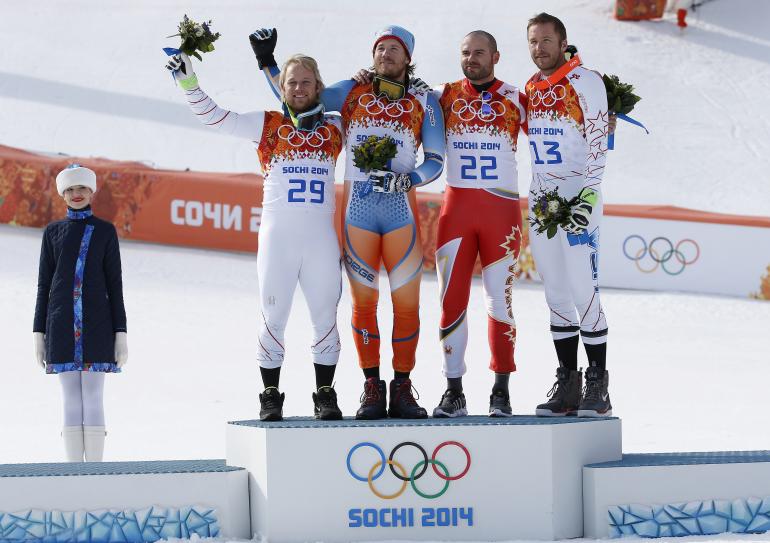Previewing the Olympic Ski Events

When the opening ceremony kicks off the XXIII Olympic Winter Games on Friday, it will not only mark the beginning of two weeks of winter sports competition - it will also mark the ending of PyeongChang's long journey from a small isolated farming community to an international destination drawing the world's focus.
A hallmark of these games will likely be the passion and enthusiasm shown by the locals - PyeongChang, isolated in one of the poorest provinces in Korea lying in the shadow of North Korea, had only been known as farm land that produced potatoes and cattle. Two previous bids to host the Olympics had failed but its persistence paid off, partly driven by the country's desire to join the handful of countries that have hosted both the Winter and Summer Olympics plus the World Cup.
The alpine skiing events will take place across two venues: Jeongseon Alpine Centre, which will host the speed events, was developed specifically with these games in mind and was a stop on the 2015-16 FIS tour. Yongpyong Resort will host the giant slalom and slalom, and hosted FIS events four times between 1998 and 2006.
To get you ready for the Olympic skiing events, we take a look back at some of our favorite moments from Olympics past, plus who to keep an eye on this year in each event.
DOWNHILL
Austrians have dominated the Olympic downhill events, winning 7 of the 18 races contested at the Olympics since it was introduced in 1948 in St. Moritz. This is usually the most high-profile and glamorous ski event during the games, in large part thanks to Franz Klammer and his run for the 1976 gold medal in Innsbruck. Facing tremendous pressure to bring home the gold in front of the home fans, as Egon Zimmerman had done in Innsbruck in 1964, Klammer skied right up to the edge - often appearing as if he would spin out of control and crash at any second. He kept it together, averaging 102 kilometers per hour on route to besting Zimmerman's time on the same course by a full half-minute. The run vaulted Klammer to international celebrity, and he was on the cover of Sports Illustrated the very next week.
This year, another Austrian, Matthias Mayer, will defend his gold medal. Expect strong challenges from the current FIS leader, Beat Feuz of Switzerland and a pair of Norwegians: Aksel Lund Svindal and Kjetil Jansrud. Thomas Dreßen, who won the prestigious Hahnenkamm downhill a few weeks ago, and a few Italians like Christof Innerhofer and Peter Fill could be in the mix as well.
When: Sunday, February 11th, 11:00am local time
SUPER-G
The Super-G competition at the last two Olympics has looked strikingly similar: a Norwegian on top of the podium with Americans taking silver and bronze. The aforementioned Jansrud and Svindal won gold in Sochi and Vancouver respectively, while Bode Miller and Andrew Weibrecht each have a silver and a bronze to their names. In one of the most dramatic moments in Sochi, Canadian Jan Hudec snuck in after Miller to post the same exact time, tying them for the bronze. It was only the second time in Olympic history that four men earned medals in a single event.
This year, the best chance to knock off one of the Norwegians will likely come from Austria: Vincent Kriechmayr, Hannes Reichelt and Max Franz are nipping at their heels on the current FIS circuit.
When: Thursday, February 15th, 11:00am local time
GIANT SLALOM
The list of Giant Slalom gold medalists is a who's who of the ski world: Eriksen, Sailer, Killy, Stenmark - all some of the most technically gifted in history, capable of producing the graceful GS turns that have long defined the discipline. That would all change in Calgary in 1988 with the arrival of a brash and bold new skier: Alberto Tomba.
At six feet and 200 pounds, the Italian was all about power; using his size to blast a straighter line through the relatively new spring-loaded gates. He announced his Olympic arrival by skiing the first run a full one second faster than the field (causing more than one competitor announce that the race was over).
The brash youngster solidified his bad boy image immediately following his first gold: he bought a Ferrari to cash in on his father's promise to buy him one if he won Olympic gold, then famously asked out Katarina Witt following her figure skating gold medal. But "La Bomba" had staying power: he won again in 1992, becoming the first man to successfully defend a gold medal in any discipline, while also adding a gold and two silvers in the slalom.
This year, American Ted Ligety, one of the disciplines most decorated skiers in recent history, is back to defend his gold. It's been a rough road for Ligety since Sochi, with multiple injuries keeping him from skiing at his highest level. He's rounding into form just in time for these Olympics, and is likely the best shot the American team has at a skiing medal.
When: Sunday, February 18th, 10:15am local time
SLALOM
We've written about our favorite Olympic slalom memory before: Twins Phil and Steve Mahre taking gold and silver in 1984, and the unlikely encounter they had with Alps & Meters founder Lou Joseph. Steve led after the first run of the '84 slalom, but was caught by Phil for the gold. Steve's response: "Phil was born four minutes ahead of me - I've been chasing him ever since."
It's been quite the battle on the FIS circuit this year between Marcel Hirscher of Austria and Henrik Kristoffersen of Norway, who have been trading the top spot on the podium all season. It should be quite a battle to see who will take gold.
When: Thursday, February 22nd, 10:15am local time




